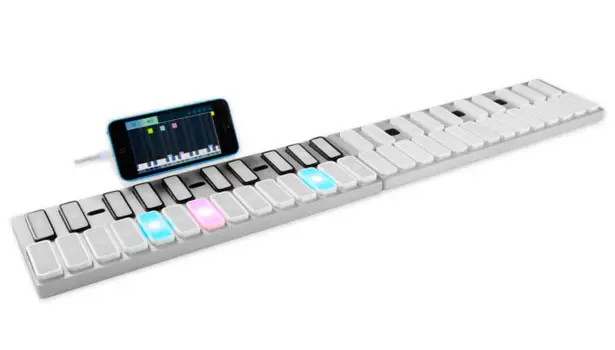Use Ipad As Midi Keyboard For Garageband
Mar 24, 2020 The quickest way to do this is to use the Launch Pad, type in 'Audio MIDI setup' and click the app's icon. After it loads, click Window and choose Show MIDI Studio. Double-click the Network box to open up network settings. The first thing you need to do is create a session. Add Apple Loops in GarageBand for iPad. GarageBand includes a set of Apple Loops you can use to easily add drum beats, bass lines, rhythm parts, and other sounds to a song. Loops contain musical patterns that can be seamlessly repeated over and over. You can extend a loop to fill any amount of time.
- Use Ipad As Midi Keyboard For Garageband Download
- Use Ipad As Midi Keyboard For Garageband Software
- Use Ipad As Midi Keyboard For Garageband Windows 7
- Ipad As Midi Controller Garageband

/livid-5bb4dac746e0fb002627f680.jpg)
Use Ipad As Midi Keyboard For Garageband Download
GarageBand User Guide for iPad
Use Ipad As Midi Keyboard For Garageband Software
If you have an external keyboard connected to your iPad, you can use keyboard shortcuts in Tracks view to play, navigate, and edit your GarageBand song.
Use Ipad As Midi Keyboard For Garageband Windows 7
Play the Keyboard in GarageBand for iPad Using the Keyboard Touch Instrument, you can play different keyboards, including grand piano, electric piano, organ, clavinet, and synthesizer, by tapping the keys. You can choose a keyboard sound, move higher or lower on the keyboard, hold notes, and change the keyboard layout and size. Use keyboard shortcuts with GarageBand for iPad If you have an external keyboard connected to your iPad, you can use keyboard shortcuts in Tracks view to play, navigate, and edit your GarageBand song. Dec 01, 2018 How to use a USB MIDI Keyboard in GarageBand iOS (iPhone/iPad). In this video, I give you my beginner's guide to all things USB MIDI keyboard in GarageBand iPhone and GarageBand iPad.
Ipad As Midi Controller Garageband
Action | Shortcut |
|---|---|
Start or stop playback | Space bar |
Go to the beginning | Return |
Move forward | Period (.) |
Move back | Comma (,) |
Create a new track | Option-Command-N |
Duplicate the selected track | Command-D |
Delete the selected track | Command-Delete |
Select previous track | Up Arrow |
Select next track | Down Arrow |
Solo the selected track | S |
Mute the selected track | M |
Undo | Command-Z |
Redo | Shift-Command-Z |
Select all regions or cells | Command-A |
Delete the selected regions | Delete |
Select the previous region on the selected track | Left Arrow |
Select the next region on the selected track | Right Arrow |
Add previous region to selection | Shift-Left Arrow |
Add next region to selection | Shift-Right Arrow |
Split selected region or event at the playhead | Command-T |
Join selected regions or notes | Command-J |
Cut | Command-X |
Copy | Command-C |
Paste | Command-V |
Loop the selected region | L |
Start recording | R |
Turn the metronome on/off | K |
Turn count-in on/off | Shift-K |
Show/Hide Remix FX | Option-R |
Show/Hide Automation | A |
Open Loop Browser | O |
Instrument Browser - Previous Instrument | Left Arrow |
Instrument Browser - Next Instrument | Right Arrow |
Show/Hide coaching tips | H |
How to install omnisphere 2 on external hard drive mac. Show Help | Option-H |